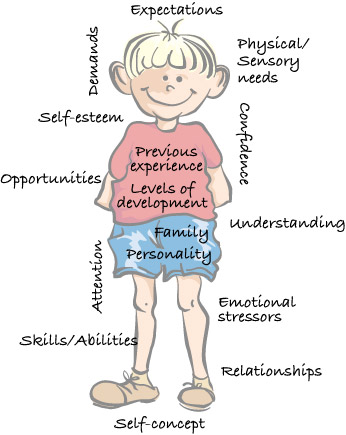1.1 Why might children behave in certain ways?
As a teaching assistant, understanding what makes children behave in the ways they do can help you to support the teacher in the classroom.
Figure 1 suggests that the root causes of behaviour are often complex and multifaceted. The child may not know himself why he is finding it difficult to do what he has been asked to do, and the adults in his life may not know either. Listening to children and helping them to both understand and talk about their feelings, as well as trying to see things from the child’s point of view, are vital skills that many adults need to learn or relearn.

The next activity describes a scenario to help you reflect on the reasons why a child may behave in an undesirable way.
Activity _unit4.1.2 Activity 2
Part 1
Read the following case study about Kyle. Read it once all the way through to familiarise yourself with Kyle’s situation.
Case study: Kyle’s behaviour
Kyle knew that he wasn’t supposed to use his mobile phone during lessons. Yet here he was at 3.30pm, the end of the school day, and he was trudging down the corridor to another detention. It wasn’t his fault he had arrived late to the lesson, and he felt a smouldering anger towards the teacher who made a sarcastic comment about the time as Kyle sidled into the room, trying to remain unnoticed.
He would like to see how that teacher managed after a sleepless night with his baby sister screaming and his mum arguing with her latest boyfriend. When the morning finally arrived, there was no sign of his school uniform in the chaos of the laundry pile and, glancing in at the barren fridge, Kyle knew that breakfast was simply not going to happen.
When he did get to school, the work for the lesson had already been handed out, and Kyle stared at the worksheet in front of him uncomprehendingly, silently asking himself why on earth he needed to know what 2n + 3y equals. He glanced over at the teacher, considering asking for help, but the teacher was with someone else at that moment.
Slumping down in his seat, Kyle pulled his mobile phone out of his pocket and started texting. The shout from the teacher interrupted this as he stormed over to Kyle and demanded that he put his phone away and get on with the work. Sullenly returning his phone to his pocket, Kyle turned back to the worksheet, understanding it no more than he had been before, and now with the prospect of yet another detention after school weighing him down.
Part 2
Now read the case study a second time, and jot down:
- Your ideas about why Kyle might have been texting in class.
- What were the triggers for Kyle’s behaviour?
- How could the situation have been handled differently?
Comment
Maybe you felt Kyle’s behaviour was justified and it was no wonder Kyle had resorted to texting. Perhaps texting at least gave him something to do in the lesson? Maybe you considered he was texting because the maths activity was something he felt was meaningless to him and it showed he had switched off from the lesson or the teacher.
The triggers for Kyle’s behaviour could have been the lack of positive engagement by the teacher, or as a result of Kyle’s home circumstances and his late arrival to the class.
Maybe both the teacher and Kyle could have handled things differently. The teacher or teaching assistant could have had a quiet word with Kyle to find out why he was late, rather than the teacher making a sarcastic comment. Or maybe you considered Kyle should have been more proactive about seeking help?
